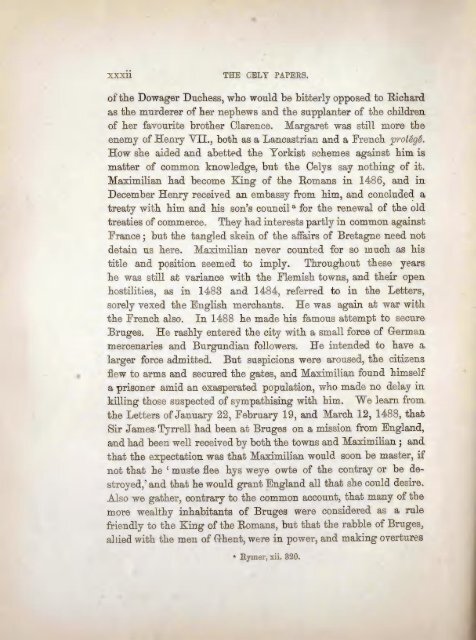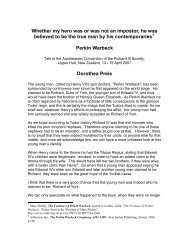Cely Papers - Richard III Society - New Zealand Branch
Cely Papers - Richard III Society - New Zealand Branch
Cely Papers - Richard III Society - New Zealand Branch
Create successful ePaper yourself
Turn your PDF publications into a flip-book with our unique Google optimized e-Paper software.
XXXll THE CELY PAPERS.<br />
of the Dowager Duchess, who would be bitterly opposed to <strong>Richard</strong><br />
as the murderer of her nephews and the supplanter of the children .<br />
of her favourite brother Clarence. Margaret was still more the<br />
enemy of Henry VIL, both as a Lancastrian and a French prolege.<br />
DW she aided and abetted the Yorkist schemes against him is<br />
matter of common knowledge, but the <strong>Cely</strong>s say nothing of it.<br />
Maximilian had become King of the Romans in I486, and in<br />
December Henry received an embassy from him, and concluded a<br />
treaty with him and his son's council a for the renewal of the old<br />
treaties of commerce. They had interests partly in common against<br />
France; but the tangled skein of the affairs of Bretagne need not<br />
detain us here. Maximilian never counted for so much as his<br />
title and position seemed to imply. Throughout these years<br />
he was still at variance with the Flemish towns, and their open<br />
hostilities, as in 1483 and 1484, referred to in the Letters,<br />
sorely vexed the English merchants. He was again at war with<br />
the French also. In 1488 he made his famous attempt to secure<br />
ruges. He rashly entered the city with a small force of German<br />
mercenaries and Burgundian followers. He intended to have a<br />
larger force admitted. But suspicions were aroused, the citizens<br />
flew to arms and secured the gates, and Maximilian found himself<br />
a prisoner amid an exasperated population, who made no delay in<br />
killing those suspected of sympathising with him. We learn from<br />
the Letters of January 22, February 19, and March 12, 1488, that<br />
Sir James Tyrrell had been at Bruges on a mission from England,<br />
and had been well received by both the towns and Maximilian ; and<br />
that the expectation was that Maximilian would soon be master, if<br />
not that he ' muste flee hys weye owte of the contray or be destroyed/<br />
and that he would grant England all that she could desire,<br />
Also we gather, contrary to the common account, that many of the<br />
more wealthy inhabitants of Bruges were considered as a rule<br />
friendly to the King of the Romans, but that the rabble of Bruges,<br />
allied with the men of Ghent, were in power, and making overtures<br />
* Bymer, xii. 320.















